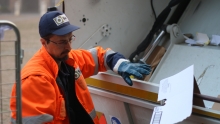Safety and health at work needs our action!

To draw attention to the fatal dangers stalking the world of work, the international trade union movement has marked April 28 as the International Commemoration Day for Dead and Injured Workers since 1996. By this, we pay our respects to departed workers and mobilise public opinion around the demands of the working class for occupational safety and health safeguards.
Since 2003, at the instance of the trade unions, the International Labour Congress has stepped into the ceremonies marking this sombre day, as the World Day for Safety and Health at Work. With themes, which address occupational safety and health gaps, the Day is set aside for actions and reflections by workers and other constituents of the ILO aimed at ensuring safe and healthy workplaces.
Rosa Pavanelli, the PSI General Secretary said:
Occupational safety and health concerns are very important for PSI. And these must be taken seriously by governments. We should not shed crocodile tears about workers sacrificing their lives in the line of duty, when necessary measures to safeguard their safety and health at work are not taken when they should have been taken.
The case of members of the National Health Workers’ Association of Liberia (NAHWAL) remains fresh in our minds. Despite the fact that preliminary analysis at the inception of the EVD outbreak showed that health workers were between 21 and 32 times more likely to be infected with Ebola than people in the general adult population, the Liberian government failed to provide basic personal protective equipment for them. This resulted in not less than occupational 718 deaths.
To make a bad situation even worse, the NAHWAL activists were victimised for daring to speak out against this horrendous situation. And for three years now, the president and general secretary of the PSI affiliate, brothers Joseph Tamba and George Poe Williams respectively have remained sacked by the Liberian government for standing up to demand safe and healthy workplaces, despite global condemnation of the termination of their appointments.
Women and men delivering public services across several sectors are daily confronted by occupational hazards. These include physical, mental, social, chemical and psychological hazards, depending on which sector they work. The least that governments at all levels can do is to ensure improvements in safety conditions at the workplace.
One of the steps we can take as workers in fighting for this is to contribute to optimal collection and use of Occupational Safety and Health (OSH) data in our workplaces, localities/municipalities, regions and countries. This is one of the reasons why the theme of this year’s World Day of Safety and Health at Work is Optimize the collection and use of OSH data.
Optimizing the collection and use of OSH data can be best done when workers are part of the governance of the OSH regime in the workplace. In several countries, employers still unilaterally determine all issues related to OSH. PSI affiliates should fight to establish bi-partite OSH committees comprising the trade unions and employers in each workplace, and for the implementation of the ILO Convention 155 in their countries, if these are not yet part integrated into OSH practices.
Making the workplace safer requires optimal collection and use of data. It also requires systemic change. The neoliberal paradigm of growth has worsened the mosaic of hazards at work. The rabid for-profit motive of the system is itself a hazard. Putting profit over people means that life matters much less than the accumulation of wealth for a handful of persons, in a world where just 8 people have as much wealth as 3.5 billion people.
We must take the lead as workers, in fighting for a better world. This includes advocacy and policy influence to ensure that our workplaces are safer and healthier.

